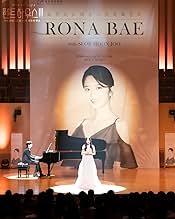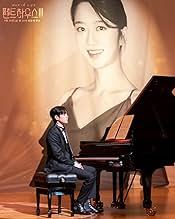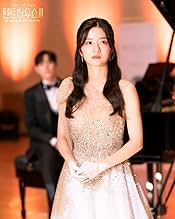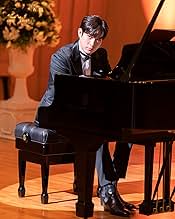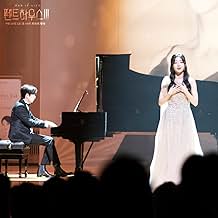A história de uma mulher que se esforça para atingir seu objetivo de entrar na alta sociedade tornando-se a "rainha" na cobertura do 100.º andar em Gangnam, o auge do sucesso em seus olhos.A história de uma mulher que se esforça para atingir seu objetivo de entrar na alta sociedade tornando-se a "rainha" na cobertura do 100.º andar em Gangnam, o auge do sucesso em seus olhos.A história de uma mulher que se esforça para atingir seu objetivo de entrar na alta sociedade tornando-se a "rainha" na cobertura do 100.º andar em Gangnam, o auge do sucesso em seus olhos.
- Prêmios
- 2 vitórias e 4 indicações no total
Explorar episódios
Avaliações em destaque
I loved the series at first, but as the story developed, it was just way too dramatic and made no sense. I really think it should have been done with two seasons. Anyway, I loved three actresses: Eugene, Kim Soyeon, and Lee Jiah.
Joo dan Rae's character is onto all his enemies and knows everything that is going on. The series is far too long.
Now once again he found about a dna test and killed that beautiful lady now framing the man for her murder is this truly how Korean rich people are?
Now once again he found about a dna test and killed that beautiful lady now framing the man for her murder is this truly how Korean rich people are?
This high-life Korean drama reminds you of all those bloodstained knife nightmares, that end with an abrupt fall from a high place , or more precisely Puccini's TOSCA......which coincidentally contains ALL these details! Though Penthouse's melodrama is scarcely believable, I'm still watching, since it's compulsive, with Mozart's Queen of the Night and Verdi's sumptuous Sempre Libera (La Traviata) thrown in, though I'm genuinely skeptical mere16-year-old students could master the tacitura. Pity really that Tosca's not got Soprano solos, like "E lucivan le stelle" for Tenor. Penthouse, nonetheless owes much to Kabuki and Greek Drama (Euripides, Sophocles, Aeschylus), whose long-forgotten audiences were frightened equally by awe-inspiring events that often shocked in juxtaposing good/evil, rich/poor, lawful/unlawful Godly/unGodly, mighty/impotent etc. The trick Penthouse seems to employ perpetually.......... is to draw its audience in - shortly before SHOCKING them! We even have the semblance of a Greek Chorus with those two chatty Heron Palace ladies and that toe-rag of a lawyer/politician. All in all, there's actually more than meets the eye to Penthouse. Hope this review will explain things a little better to the curious, or for the Music-lover to search YouTube for Puccini's, E lucivan le stelle, (Pavarotti, or Placido Domingo).
I originally rated this a 10 but the bullying is going on too much and is teaching children who watch this series it's ok to bully.
Rich people can be so nasty and why do they hit their employees?
Rich people can be so nasty and why do they hit their employees?
I rarely write reviews but after the 3rd or 4th episode of The Penthouse I felt compelled to put down my thoughts.
I've get a lot of viewing pleasure from TV shows and movies that originate in Korea. They've got subject matter for every taste: action/adventure, comedies, historical dramas, horror features, etc. It's opened a brand new viewing experience for me. I've enjoyed shows of every type and believe Korea has very talented writers and some terrific stories to tell. Production values vary from show to show as does acting ability, but that happens in cinema from all over the world.
My review is to address a subject I see in many of the shows I watch-physical abuse or assault. I'm not talking about the choreographed fights in a spy movie or the sword play in an historical show. I'm talking abuse in the life of every day Koreans. Family violence, workplace abuse and school bullying in particular.
What I find disturbing is the frequency with which it pops up in Korean shows. It's not a random occurrence. It's rarely seems essential to the storyline. It's been presented in every possible genre of storytelling. What adds to this disturbing element is the way the violence is presented as being accepted or acceptable. There is rarely any involvement of any type of authority when the violence is shown. School bullying? Workplace violence? It's repeated in series after series with there rarely being consequences for the assailant or justice for the abused. It's almost as if it's being presented as an acceptable and tolerated part of most Korean's lives. That a slap in the face should be taken. Or a kick or a push. And we all know that can't be a true reflection of the Korean people and their daily experiences, can it?
Of course Korean writers and storytellers don't want think that because Korea is a patriarchal society or because historically this type of behavior has been experienced that viewers should assume it's commonplace behavior in this day and age. Yet that is exactly how it's portrayed. Often.
This is only my perception. Others may not feel the same at all. But, to me, it's a sad element of too many Korean productions.
End of rant.
I've get a lot of viewing pleasure from TV shows and movies that originate in Korea. They've got subject matter for every taste: action/adventure, comedies, historical dramas, horror features, etc. It's opened a brand new viewing experience for me. I've enjoyed shows of every type and believe Korea has very talented writers and some terrific stories to tell. Production values vary from show to show as does acting ability, but that happens in cinema from all over the world.
My review is to address a subject I see in many of the shows I watch-physical abuse or assault. I'm not talking about the choreographed fights in a spy movie or the sword play in an historical show. I'm talking abuse in the life of every day Koreans. Family violence, workplace abuse and school bullying in particular.
What I find disturbing is the frequency with which it pops up in Korean shows. It's not a random occurrence. It's rarely seems essential to the storyline. It's been presented in every possible genre of storytelling. What adds to this disturbing element is the way the violence is presented as being accepted or acceptable. There is rarely any involvement of any type of authority when the violence is shown. School bullying? Workplace violence? It's repeated in series after series with there rarely being consequences for the assailant or justice for the abused. It's almost as if it's being presented as an acceptable and tolerated part of most Korean's lives. That a slap in the face should be taken. Or a kick or a push. And we all know that can't be a true reflection of the Korean people and their daily experiences, can it?
Of course Korean writers and storytellers don't want think that because Korea is a patriarchal society or because historically this type of behavior has been experienced that viewers should assume it's commonplace behavior in this day and age. Yet that is exactly how it's portrayed. Often.
This is only my perception. Others may not feel the same at all. But, to me, it's a sad element of too many Korean productions.
End of rant.
Você sabia?
- CuriosidadesKim So Yeon and Kim Yoo Jin worked with each other's husband on different dramas. Kim So Yeon worked with Kim Yoo Jin's husband Ki Tae Young on Mother of Mine (2019) and Kim Yoo Jin worked with Kim So Yeon's husband Lee Sang Woo on All About My Mom (2015).
- Trilhas sonorasLife
Performed by HEDY
Principais escolhas
Faça login para avaliar e ver a lista de recomendações personalizadas
- How many seasons does The Penthouse: War in Life have?Fornecido pela Alexa
Detalhes
- Tempo de duração
- 1 h 10 min(70 min)
- Cor
- Proporção
- 4K UHD
Contribua para esta página
Sugerir uma alteração ou adicionar conteúdo ausente

![Assistir a Trailer - Season 2 [OV]](https://m.media-amazon.com/images/M/MV5BYTIyNjRkZTYtNzQ1My00Zjc0LWEyNGItMjM5YTEyYWQ1MjhlXkEyXkFqcGdeQXRyYW5zY29kZS13b3JrZmxvdw@@._V1_QL75_UX500_CR0)

